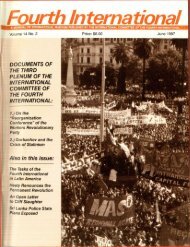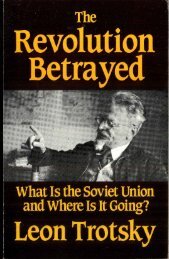Workers League - Behind the US invasion of Somalia - Mehring Books
Workers League - Behind the US invasion of Somalia - Mehring Books
Workers League - Behind the US invasion of Somalia - Mehring Books
You also want an ePaper? Increase the reach of your titles
YUMPU automatically turns print PDFs into web optimized ePapers that Google loves.
Italian rule.<br />
Following <strong>the</strong> Italian victory, <strong>the</strong> full force <strong>of</strong> <strong>the</strong> fascist dictatorship<br />
was unleashed in <strong>the</strong> new colony, Italian East Africa, which<br />
combined <strong>Somalia</strong>, Ethiopia and Eritrea. Interracial marriage was<br />
forbidden and <strong>the</strong> inhabitants <strong>of</strong> all three territories were subjected<br />
to institutionalized oppression. They resisted fiercely. In 1937 an<br />
attempt was made to assassinate <strong>the</strong> Italian governor at Addis Ababa<br />
and a reign <strong>of</strong> terror followed, with widespread arrests and summary<br />
executions. But <strong>the</strong> unrest became even more intense until in 1941,<br />
<strong>the</strong> Italian territories were invaded by a combined force <strong>of</strong> British and<br />
Ethiopian exile troops. From <strong>the</strong>n on, <strong>the</strong>y were controlled by Britain<br />
until <strong>the</strong> end <strong>of</strong> <strong>the</strong> war.<br />
The Legacy <strong>of</strong> Imperialist Domination<br />
The carve-up <strong>of</strong> <strong>the</strong> Horn <strong>of</strong> Africa during and after World War<br />
II provides fur<strong>the</strong>r pro<strong>of</strong> that this imperialist bloodbath was not a war<br />
against fascism or for democracy and self-determination. Like <strong>the</strong><br />
first global conflagration which broke out in 1914, World War II was<br />
essentially a struggle among <strong>the</strong> imperialist powers over control <strong>of</strong><br />
markets, colonies and strategic positions.<br />
The main line <strong>of</strong> <strong>the</strong> conflict was between <strong>the</strong> Allied imperialist<br />
powers — <strong>the</strong> <strong>US</strong>, Britain and <strong>the</strong> French exile forces <strong>of</strong> de Gaulle —<br />
and <strong>the</strong> Axis powers — Germany, Italy and Japan. 8<br />
But <strong>the</strong> struggle<br />
for colonial influence went on in a different form within <strong>the</strong> camps<br />
and political overtures were made from time to time between <strong>the</strong><br />
camps. This internecine conflict was especially sharp over <strong>the</strong> question<br />
<strong>of</strong> <strong>the</strong> British and French colonial empires.<br />
In 1941, Churchill and Roosevelt issued <strong>the</strong> Atlantic Charter,<br />
which supposedly upheld <strong>the</strong> right <strong>of</strong> all peoples to choose <strong>the</strong>ir own<br />
government. 9<br />
American imperialism sought to wrap itself in <strong>the</strong><br />
mantle <strong>of</strong> anticolonialism and democracy, intending that her own<br />
commercial interests would fill <strong>the</strong> gap left by <strong>the</strong> former colonial<br />
powers. Churchill, for his part, insisted that promises <strong>of</strong> self-determination<br />
applied only to <strong>the</strong> conquered nations <strong>of</strong> Europe, not British<br />
colonies. "We mean to hold our own," he insisted in 1942. "I did not<br />
31





